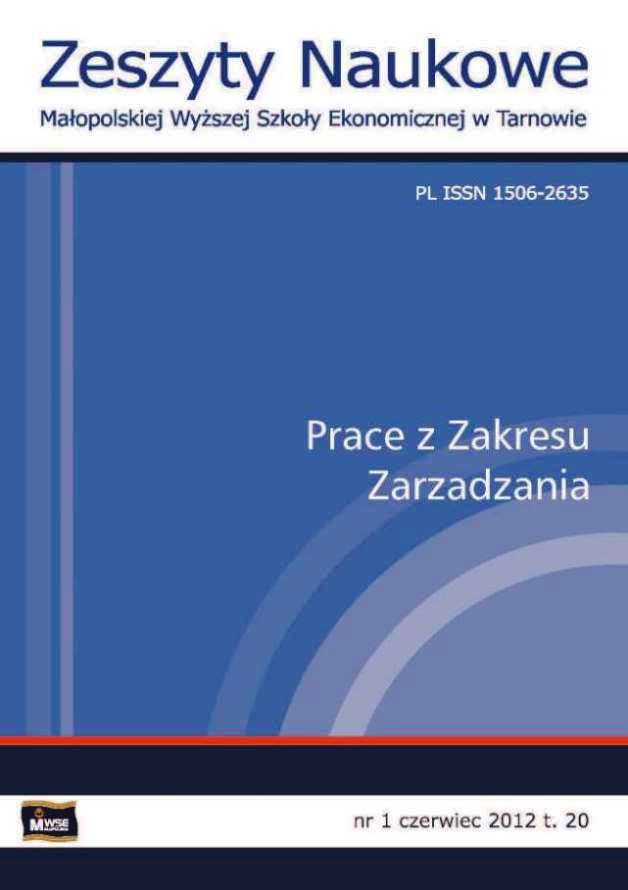Abstract
The author of the article analyses the issue of two different academic approaches in contemporary research on cultural management in Poland. Peter Bendixen describes them as the two paradigms—Platonic (instrumental) and Aristotelian. According to the German researcher, the Platonic approach is dominated by elements of company management, in both quantitative and qualitative aspects, while the Aristotelian approach assumes that the only role of cultural management is to support art. Researchers classified by the author as followers of the Platonic approach support the idea of transfering organizational solutions and principles of the new economy of the public sector into the cultural sector. Professor Jerzy Hausner criticizes weak points of the public cultural institutions, such as deficiencies in employment policy, lack of incentives for improved performance, bureaucratic behaviours, avoidance of risk, lack of competition, great influence of political factors. Professor Pawelska-Skrzypek points out the necessity to introduce indicators of effectiveness in the area of culture, which would enable proper assessment of the functioning of public cultural institutions. According to research workers supporting the Artistotelian approach to cultural management, ‘instrumentalists’ transfer management tools that are effective in other sectors of economy too mechanically. Opponents of the Platonic approach stress out the immeasurable character of cultural values as well as the existence of conflicting ideas within this theory, i.e. simultaneous growth of the commercial function and extension of the scope of artistic creation in public cultural institutions. Moreover, they talk about negative external factors influencing the society’s access to culture, which require serious changes in the system.
References
Barwacz K., Kierunki doskonalenia systemu nadzoru korporacyjnego przedsiębiorstw publicznych na przykładzie sektora komunalnego, „Zeszyty Naukowe Małopolskiej Wyższej Szkoły Ekonomicznej w Tarnowie” 2009, nr 2(13), t. 2, s. 169-179.
View in Google Scholar
Bendixen P., O filozoficznych fundamentach zarządzania kulturą, „Zarządzanie Kulturą” 2008, z. 1.
View in Google Scholar
Bendixen P., Wprowadzenie do ekonomiki kultury i sztuki, Wydawnictwo UJ, Kraków 2001. ISBN 83-233-1504-3.
View in Google Scholar
Gałuszka P., Biznes muzyczny, Wyd. Placet, Warszawa 2009. ISBN 978-83-7488-146-3.
View in Google Scholar
Golinowska S ., Ekonomika kultury. Stan badań, „Ekonomista” 1991, nr 1.
View in Google Scholar
Hausner J., Instytucje kultury w czasach kryzysu. Wyzwania i zagrożenia - w jakich warunkach możliwa jest transformacja i nowoczesny model funkcjonowania instytucji? W: J. Sójka (red.), Instytucje kultury w czasach kryzysu, Bogucki Wydawnictwo Naukowe, Poznań 2009. ISBN 978-83-61320-73-9.
View in Google Scholar
Ilczuk D., Zmiany w organizacji i finansowaniu narodowych instytucji kultury w Europie. Prywatyzacja i deetatyzacja, „Zarządzanie w Kulturze” 2003, t. 4, z. 6.
View in Google Scholar
Kietlińska K., Finansowanie kultury: dylematy teorii i praktyki, Wydawnictwo Uniwersytetu Łódzkiego, Łódź 1995. ISBN 83-7016-883-3.
View in Google Scholar
Kłoskowska A., Kultura masowa – krytyka i obrona, PWN, Warszawa 1980. ISBN 83-01-01511-X.
View in Google Scholar
Kołodko G.W., Wędrujący świat, Prószyński i S-ka, Warszawa 2008. ISBN 978-83-7469-712-5.
View in Google Scholar
Łysiński J., Bariery rozwoju funkcji komercyjnej samorządowych filharmonii w Polsce, praca doktorska, Wydział Zarządzania i Komunikacji Społecznej UJ, Kraków 2007.
View in Google Scholar
Łysiński J., Dylematy związane z analizą wskaźników efektywności instytucji artystycznych na przykładzie filharmonii samorządowych w Polsce. W: J. Sójka (red.), Instytucje kultury w czasach kryzysu, Bogucki Wydawnictwo Naukowe, Poznań 2009. ISBN 978-83-61320-73-9.
View in Google Scholar
Mandel B., Kształcenie w zakresie zarządzania kulturą w szkołach wyższych - między wymogami teorii a potrzebami praktyki, „Zarządzanie Kulturą” 2008, z. 1.
View in Google Scholar
Nesbitt R.G., Nie oglądaj się za siebie w gniewie. W: M. Lind, R. Minichbauer (red.), Europejskie polityki kulturalne 2015, Fundacja Bęc Zmiana, Warszawa 2009. ISBN 978-83-925107-4-1.
View in Google Scholar
Pawłowski R., Kultura jest dla obywateli. Wywiad z prof. Jerzym Hausnerem, „Gazeta Wyborcza. Kultura”, 22.12.2010, nr 298, s. 15.
View in Google Scholar
Prawelska-Skrzypek G., Polityka kulturalna polskich samorządów. Wybrane zagadnienia, Wydawnictwo UJ, Kraków 2003. ISBN 83-233-1700-3.
View in Google Scholar
Prawelska-Skrzypek G., Regionalne zróżnicowanie polityki kulturalnej polskich miast. W: J. Sójka (red.), Instytucje kultury w czasach kryzysu, Bogucki Wydawnictwo Naukowe, Poznań 2009. ISBN 978-83-61320-73-9.
View in Google Scholar
Smithuijsen C.B., 23 European Countries Reflect on Privatization, Desetatisation and Culture: Introduction to the Country Reports. W: A. van Hemel, N. van der Wielen (red.), Privatisation/Desetatisation and Culture, Conference Reader for the Circle Round Table, Boekman Foundation/Twente University, Amsterdam 1997, s. 91-97.
View in Google Scholar
Sowa J., Rewolucja kulturalna – tak, ale jaka? O możliwych kierunkach polskiej polityki kulturalnej, „Zarządzanie Kulturą” 2010, nr 3.
View in Google Scholar
Stiglitz J., Ekonomia sektora publicznego, Wyd. Naukowe PWN, Warszawa 2004. ISBN 83-01-14338-X.
View in Google Scholar
Światowy G., Kuźniak K., Orientacja marketingowa w tworzeniu oferty rynkowej filharmonii. W: S. Flejterski , E. Roszkowska (red.), Teatry w Europie, Opera na Zamku, Szczecin 2004. ISBN 83-909715-3-4.
View in Google Scholar
Trzeciak H., Ekonomika teatru, Instytut Teatralny, Warszawa 2011. ISBN 978-83-931155-9-4.
View in Google Scholar
Uzupełnienie Narodowej Strategii Rozwoju Kultury na lata 2004–2020, Ministerstwo Kultury, Warszawa 2005.
View in Google Scholar
© Copyright by Małopolska School of Economics in Tarnów. The articles are available under the Creative Commons Attribution NonCommercial-NoDerivatives 4.0 International License


